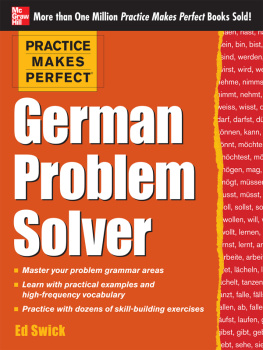PRACTICE MAKES PERFECT
French Sentence Builder
PRACTICE MAKES PERFECT
French Sentence Builder
Eliane Kurbegov


Copyright 2009 by The McGraw-Hill Companies, Inc. All rights reserved. Except as permitted under the United States Copyright Act of 1976, no part of this publication may be reproduced or distributed in any form or by any means, or stored in a data base or retrieval system, without the prior written permission of the publisher.
ISBN: 978-0-07-160038-5
MHID: 0-07-160038-8
The material in this eBook also appears in the print version of this title: ISBN: 978-0-07-160037-8, MHID: 0-07-160037-X.
All trademarks are trademarks of their respective owners. Rather than put a trademark symbol after every occurrence of a trademarked name, we use names in an editorial fashion only, and to the benefit of the trademark owner, with no intention of infringement of the trademark. Where such designations appear in this book, they have been printed with initial caps.
McGraw-Hill eBooks are available at special quantity discounts to use as premiums and sales promotions, or for use in corporate training programs. To contact a representative please e-mail us at bulksales@mcgraw-hill.com.
TERMS OF USE
This is a copyrighted work and The McGraw-Hill Companies, Inc. (McGraw-Hill) and its licensors reserve all rights in and to the work. Use of this work is subject to these terms. Except as permitted under the Copyright Act of 1976 and the right to store and retrieve one copy of the work, you may not decompile, disassemble, reverse engineer, reproduce, modify, create derivative works based upon, transmit, distribute, disseminate, sell, publish or sublicense the work or any part of it without McGraw-Hills prior consent. You may use the work for your own noncommercial and personal use; any other use of the work is strictly prohibited. Your right to use the work may be terminated if you fail to comply with these terms.
THE WORK IS PROVIDED AS IS. McGRAW-HILL AND ITS LICENSORS MAKE NO GUARANTEES OR WARRANTIES AS TO THE ACCURACY, ADEQUACY OR COMPLETENESS OF OR RESULTS TO BE OBTAINED FROM USING THE WORK, INCLUDING ANY INFORMATION THAT CAN BE ACCESSED THROUGH THE WORK VIA HYPERLINK OR OTHERWISE, AND EXPRESSLY DISCLAIM ANY WARRANTY, EXPRESS OR IMPLIED, INCLUDING BUT NOT LIMITED TO IMPLIED WARRANTIES OF MERCHANTABILITY OR FITNESS FOR A PARTICULAR PURPOSE. McGraw-Hill and its licensors do not warrant or guarantee that the functions contained in the work will meet your requirements or that its operation will be uninterrupted or error free. Neither McGraw-Hill nor its licensors shall be liable to you or anyone else for any inaccuracy, error or omission, regardless of cause, in the work or for any damages resulting therefrom. McGraw-Hill has no responsibility for the content of any information accessed through the work. Under no circumstances shall McGraw-Hill and/or its licensors be liable for any indirect, incidental, special, punitive, consequential or similar damages that result from the use of or inability to use the work, even if any of them has been advised of the possibility of such damages. This limitation of liability shall apply to any claim or cause whatsoever whether such claim or cause arises in contract, tort or otherwise.
Introduction
English and French have many similarities such as common vocabulary words derived from Latin. Knowing these words makes it easier for a speaker of English to learn and remember French words. However, when it comes to word order, French and English sentences may sometimes differ. For example, adverbs are usually placed before a verb in English but after the verb in French.
This book will help you compare the syntax of French and English sentences, allow you to revisit grammatical concepts such as object pronouns (focusing on their position in the French sentence), and provide you with many opportunities to write the least as well as the most complex sentences. This book and a little determination will undoubtedly make you a better writer.
A step-by-step approach to analyzing the components of a sentence paired with a guided structuring of phrases, sentences, and ultimately paragraphs will allow you to hone your writing skills.
The structures that are explained and practiced in this book progress from basic phrases, such as demain (See you tomorrow), to increasingly complex sentences including relative and subjunctive clauses. Many diagrams accompany information to illustrate the functions and positions of the various parts of a sentence.
This book provides an abundance of exercises to help you practice building and structuring a great variety of sentences. Some exercises aim at helping you understand structures by identifying or matching components, while others require restructuring, modifying, and writing new sentences. The ultimate goal is to write full sentences independently. The last few chapters of this book allow you to progress from writing sentences to writing paragraphs, e-mails, and letters.
An answer key is provided with actual or suggested answers for all exercises or with models for such activities as letter writing.
Writing can be challenging in any language, but rest assured that close attention to the rules of sentence building combined with regular practice will make you a better writer. This book will provide you with ample opportunities to build sentences while at the same time building your confidence as a writer.
PRACTICE MAKES PERFECT
French Sentence Builder
1 Declarative sentences and word order
It is important to understand the difference between a phrase and a sentence. They are different in nature and serve different purposes.
What is a phrase?
A phrase consists of more than one word but does not have the subject + verb organization of a sentence.
one or more words excluding a verb phrase
subject + predicate (including verb) sentence
Some phrases are formulas used frequently in social situations. Other phrases are common sayings or proverbs. Notice that they do not have a subject + verb structure:

What is a sentence?
Unlike a phrase, a sentence is defined as a grammatical unit. To build this unit in French, you need nouns, verbal structures, object pronouns, adverbs, etc.elements you may have previously learned. Think of these elements as the blocks that help you build a structure, the sum of the pieces of a whole that has a meaning of its own. A sentence includes a subjecta word or a group of words that tell you what or whom the sentence is aboutand a predicatea word or words that tell us something about the subject. Spelling and punctuation require a capital letter to start a sentence and a period to indicate the end of the message.

This is a sentence because there is a subject (on) and a predicate (se verra ce soir), as well as the verb
Next page







